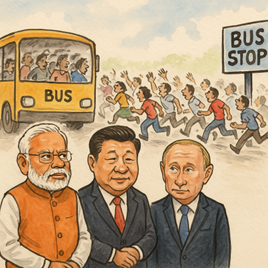



The world wants a power trio. India just wants to avoid missing it.
So here we are again. China has proposed a warm new trio—India, Russia, and China—joining hands to combat what they call “the economic and tariff threat” from the United States. It’s the kind of diplomatic headline that promises great power coordination. But all it did was remind me of Cho Ramaswamy.
Yes, Cho—the satirist, dramatist, columnist, and the vibhudhi foreheaded Vidhura of modern India. He could cut through a politician’s rhetoric with the same ease that he sliced logic into laugh-out-loud phrases. He shaped how many of us think about politics: not in grand theories, but in everyday truths.
I was once in the audience when he narrated that timeless Mahabharata story—the cat, the rat, and the hunter. In the front row sat a certain Chief Minister from Gujarat, now our Prime Minister. Cho looked right at him as he began a story , the story that epitomizes how, “trust is tactical, not eternal—and survival always outranks sentiment.”
In the outskirts of a village, a cat gets trapped in a hunter’s net. It meows pathetically for rescue. A rat nearby, itself dodging a hungry vulture, hears the cat plead for rescue.
“Please, save me,” the cat begs. “I swear, I’ll never harm you.”
The rat agrees, gets into the net protecting itself from the vulture—but stalls cutting the net. It nibbles a knot, looks around, chews a bit more, and then pauses. Minutes turn hours..The cat grows anxious.
“What are you waiting for? The hunter’s cooking fire?”
The rat replies calmly, “I am here to do it ..but not until the hunter appears, at which time your survival instinct will be greater than your hunger – so I will survive. That’s when I’ll finish the job.”
And so it does. The hunter arrives, the rat cuts the net, and the cat runs its life and rat the other side. Happy ending for both.
The next day, the cat returns, gratitude in its whiskers.
“Let’s be friends for life.”
The rat, wise and firm, says, “Yesterday’s friendship was born out of circumstance. You are a predator. I am prey. We helped each other because we had to, not because we should.”
Cho told that story, then smiled at the man who would later lead India and said: “That, sir, is foreign policy.”
And today? That fable is more alive than ever.
Let’s be clear: We need China.
From antibiotic precursors to aviation components, from EV battery cells to solar panels, China is hardwired into our supply chains. Talk of Atma Nirbhar Bharat is noble—but we’re years, if not decades, away from shutting the door on Chinese manufacturing without shooting ourselves in the wallet.
We may distrust the dragon, but its factory floor still keeps our economy ticking.
We need the U.S. too.
Not just to counter China, but to be heard in the Western corridors where Washington still carries the last word. The U.S. helps amplify our voice on climate, security, and digital regulation. Their markets matter. Their tariffs hurt. Their friendship offers not comfort—but leverage. And yes, we do need an insurance policy against Russian armoury that squeaks more than it roars these days.
And of course, we need Russia.
The relationship is ancestral. Strategic. Emotional even. From cryogenic engines to crude oil discounts, Russia has lit our wick when the West looked the other way. But Russia today is desperate—trying to hold its ground against Chinese encroachment into Siberia even as it hugs Beijing tighter. We need to hold that relationship—but with our eyes open.
But who needs us?
Let’s not forget—we’re not just passengers in this game.
The U.S. and the West need India to hold the line in the Indo-Pacific, to police sea lanes the Australians and Japanese rely on, to remain the one democracy that’s not imploding.
Russia needs us as ballast—to avoid becoming Beijing’s obedient satellite.
And yes, even China needs our market, our trade routes, our neutrality in times of conflict.
So we are not small players here. But we must play smart.
We’ve tried some scripts. Remember Mahabalipuram? That barefoot beach diplomacy with Xi Jinping? The Trump-Modi extravaganza in Houston? “Namaste Trump,” “Trump Sarkar ek baar phir?”
Well, neither the beach nor the stadium helped keep Chinese troops off our borders or American tariffs off our exports.
Modi now needs a deeper script. Not just one crafted with handshakes and hashtags, but one that understands that the world has no permanent friends or enemies—only interests.
And if we need a guiding light, it’s not in White House memos or Kremlin cables. It’s in the timeless logic Cho Ramaswamy borrowed from Vyasa:
There is no such thing in existence as a foe or a friend. Only circumstances create friends and foes. Both arise from considerations of interest and gain.
Friendship morphs into enmity over time. Similarly, a foe can become a friend.
One becomes dear due to his purpose, his words, or his utility. When the cause disappears, so does the affection.
That’s it. Not Harvard. Not RAND. Just Mahabharata—and Cho the vibhuthi wearing truth teller from Mylapore.
And us?
Well, we’re not sitting at summits.
We’re figuring out how to squeeze into an overflowing bus.
We’re standing in an invisible queue at the RTO, with forms signed but never accepted.
We’re leaping over flooded potholes that have outlasted governments.
We’re still negotiating with a sub-registrar’s assistant for a death certificate, while world leaders negotiate defence logistics.
Our destiny isn’t being discussed over wine in Geneva. It’s playing out in crowded lanes, broken bylaws, and Election Manifestos that serve as our only Vidura Nidhi—read during campaigns, forgotten after victories.
So let the leaders play cat and rat.
We’ll keep dodging the vulture of red tape, and hoping that someone—just someone—clears that pothole outside before the next monsoon.